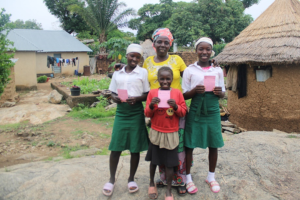From Survivor to Advocate: How a Cervical Cancer Survivor is Championing HPV Vaccination in Plateau State
Jos, In 2021, Mrs. Sarah Abok, a 47-year-old mother from Mangu Local Government Area (LGA) in Plateau State, Nigeria, faced a life-altering diagnosis: cervical cancer. The news struck fear into her heart, not just for her own life, but for the future of her family. “I kept thinking about what would happen to my children if I didn’t survive,” Sarah recalls. The journey that followed was gruelling, involving invasive surgery and multiple rounds of chemotherapy. The treatment was not only painful but also financially draining, leaving Sarah determined to spare others from the same ordeal.
When Sarah learned that the Nigerian government had introduced the Human Papillomavirus (HPV) vaccine into its National Routine Immunization (RI) Schedule for girls aged nine to 14, she felt a surge of hope. The vaccine, provided at no cost, offers protection against the virus responsible for most cases of cervical cancer. “I knew I had to ensure my daughters, and their friends received the HPV vaccine,” Sarah says with conviction. “I wouldn’t wish my experience on my two daughters or any woman.”
Turning her pain into purpose, Sarah became a vocal advocate for HPV vaccination in her community. From her daughters’ school to her place of worship, she shared her story with families, friends, and caregivers, urging them to vaccinate their eligible daughters. “I hope every girl can get vaccinated against this virus,” she says passionately.
A National Effort to Combat Cervical Cancer
Sarah’s story coincides with a transformative moment in Nigeria’s public health landscape. In October 2023, the Nigerian government, through the National Primary Health Care Development Agency (NPHCDA), partnered with the World Health Organization (WHO), GAVI, the Vaccine Alliance, and other stakeholders to roll out the HPV vaccine nationwide. This initiative targets girls aged nine to 14, aiming to protect them before they are exposed to the virus.
Cervical cancer remains a significant public health challenge in Nigeria, where it ranks as the second most common cancer among women. Each year, an estimated 13,676 women are diagnosed, and approximately 7,093 lose their lives to the disease. Yet, more than 90% of these cases are preventable with a single dose of the HPV vaccine if administered before exposure to the virus, which is commonly transmitted through sexual contact.
To ensure the successful rollout of the HPV vaccine, WHO provided extensive technical support to the Nigerian government. This included training over 104,030 health workers on vaccine administration, developing strategies for efficient delivery in health facilities and communities, and combating misinformation by providing accurate, evidence-based information. WHO also collaborated with traditional and social institutions to raise awareness about the importance of HPV vaccination and boost coverage nationwide.
Since the programme’s launch, more than 12.26 million adolescent girls across Nigeria have received the HPV vaccine, a monumental step toward eliminating cervical cancer as a public health threat.
A Local Impact in Plateau State
In Plateau State, where Sarah resides, the impact of this initiative is palpable. Dr. Luka Izang, Director of Immunization and Disease Control at the Plateau State Primary Health Care Board commended the collaborative efforts of the government, WHO, GAVI, and other partners. “There is a proactive need to protect young girls aged nine to 14 who are not yet sexually active, as cervical cancer is sexually transmitted and primarily affects women,” Dr. Izang explains. “This vaccine is a game changer in safeguarding their future.”
Sarah’s advocacy has contributed to growing awareness in her community. Parents like Mr. Joel Sylvester, a father of two daughters in Jos, have embraced the vaccine after initial hesitation. “When I first heard about a vaccine to prevent cervical cancer, I had doubts,” Joel admits. “But after learning more, I knew my daughters had to receive it. I am grateful to the government, WHO, and everyone who made this possible.”
WHO’s Commitment to Cervical Cancer Elimination
The introduction of the HPV vaccine aligns with WHO’s global call in 2018 to eliminate cervical cancer through three key interventions: HPV vaccination, screening and treatment of pre-cancerous lesions, and management of cervical cancer. WHO Country Representative in Nigeria, Dr. Walter Kazadi Mulombo, hailed Nigeria’s efforts as a model of commitment to public health. “Nigeria has shown outstanding dedication to safeguarding the future of its younger generation,” Dr. Mulombo says. “WHO will continue to support the country with innovative health initiatives to ensure access to vaccination and cervical cancer prevention, promoting wellbeing among girls and women.”
Sarah’s journey, from a survivor of cervical cancer to a champion of prevention, underscores the power of personal stories in driving public health change. As she continues her advocacy, she dreams of a future where no woman must endure the pain she did. “This vaccine is hope,” she says with a smile. “Hope for my daughters, hope for every girl.”
Through partnerships, innovation, and community engagement, Nigeria is taking bold steps toward a cervical cancer-free future—one vaccine, one story, and one advocate at a time.



